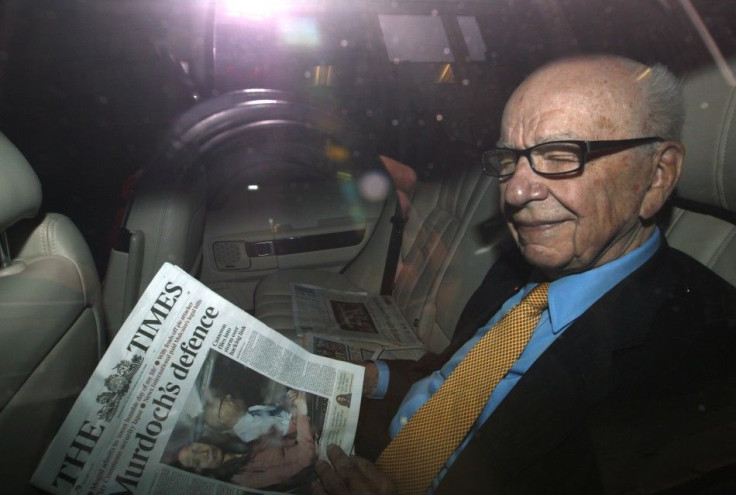Why is News Corp. Buying Back Its Shares?

News Corp., still burdened by an ongoing phone-hacking scandal at its British subsidiaries, is aggressively buying back shares in an effort to buttress its share price.
The $5 billion repurchase program -- the largest in the media giant’s history -- was announced on July 12, during the height of the hacking scandal that had engulfed the News of the World tabloid, owned by News International, a UK subsidiary of News Corp.
At the time, the company said the authorization would last for 12 months.
The day after the share buyback was announced, News Corp. dropped its controversial efforts to acquire all remaining interest in U.K. satellite TV operator British Sky Broadcasting amid pressure from legislators who threatened to block the deal following the hacking scandal.
Recently, the buyback has picked up speed.
On Sept. 20, Reuters reported News Corp. had already repurchased more than $1 billion in shares over the past month, or more than 65.6 million Class A shares at prices between $15.64 and $17.34 per share, during the period from Aug. 15 to Sept. 18.
The buyback would appear to have been a partial success.
From the announcement of the July 12 authorization, News Corp. Class A shares climbed nearly 13 percent through Aug. 29. Since that time, however, the shares have declined 9.4 percent though Thursday.
News Corp. shares remain about 15 percent below this year’s peak that was reached at the end of May.
In any case, Wall Street analysts have applauded the move by News Corp.
According to Reuters, Thomas Eagan, an analyst at Collins Stewart, said Based on the pace of the repurchases, we expect News Corp. to increase authorization for more, possibly by the end of the year. News Corp. trades at a discount to its peers because investors feel management isn't shareholder friendly. With this aggressive buyback, they are gradually ameliorating those concerns.
Similarly, Richard Greenfield, an analyst at BTIG, noted that News Corp. is already well ahead of meeting its goal of buying back $5 billion of shares by next year. He said the “company has apparently set up an automated daily buyback program during its traditional pre/post-quarterly earnings blackout period.”
Assuming the shares remain at about $17, Greenfield estimates News Corp. will have repurchased almost $2.2 billion in shares by as early as Nov. 7.
David B. Smith, chief investment officer of Rockland Trust Investment Management Group, in Rockland, Mass., also applauded the buyback program.
Smith told International Business Times the buyback was likely initiated for two principal reasons: to pump up the value of shares that had been mired not only by the hacking scandal, but also by a malaise in the broader equities market; and to try to repair relations with shareholders who have often winced at strategic decisions made by company chairman Rupert Murdoch that might not be in their best interests.
“Buying back shares in a very smart thing to do,” said Smith. “Companies are flush with cash and by repurchasing shares, they keep stockholders happy and stimulate the equity price.”
Stock buybacks also help to boost a company’s price-earnings ratio.
The Federal Reserve reported recently that non-financial U.S. companies held more than $2 trillion in cash and other liquid assets at the end of June, up more than $88 billion from the end of March. Moreover, cash accounted for 7.1 percent of all company assets, the highest such level since 1963.
Thus, companies would appear to be amply funded to repurchase shares.
News Corp. might have more motivation than other companies to aggressively buy back shares.
Smith points out that shares of News Corp. have historically underperformed media rivals like Walt Disney and Time Warner.
Indeed, News Corp. shares are trading at a forward P/E ratio of about 9.4 – compared with figures of 10.2 and 9.5 for Disney and Time Warner, respectively.
Smith party attributes this cheaper valuation to Rupert Murdoch himself, who is frequently criticized by shareholders for making decisions to benefit his family instead of the other holders.
Moreover, News Corp. has a highly unusually ownership arrangement – namely a dual-share structure which carry unequal voting rights and give the Murdoch family effective control of the company.
An article in The Washington Post recently stated: The Murdoch family owns only about 12 percent of News Corp., but Rupert Murdoch sure runs the place like a wholly-owned family candy store. How can Murdoch do this with only about a 12 percent stake in a giant public company? Because only about 30 percent of News Corp.'s shares have voting power, and Murdoch and a family trust own 40 percent of them.”
Overall, share buybacks have been on the rise this year across the corporate landscape.
Standard & Poor’s noted that share repurchases in the second quarter of 2011 among companies in the S&P 500-stock index amounted to $109.2 billion -- 21.6 percent higher than in the first quarter; and up 40.7 percent from the second quarter of 2010.
Moreover, the second quarter of 2011 represented the eighth consecutive quarterly increase for share buybacks.
“Companies returned to the $100 billion quarterly buyback level in the second quarter as they continued to match and control employee options, thereby protecting their earnings per share,” said Howard Silverblatt, senior index analyst at S&P Indices.
“At this point, companies are continuing to use buybacks to prevent earnings dilution from employee options, as well as shares used for dividend reinvestment programs. Few companies are venturing outside of the box to purchase additional shares, as was the common practice from late 2005 through mid-2007.”
© Copyright IBTimes 2024. All rights reserved.





















